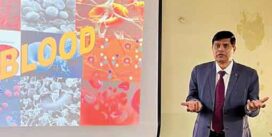- स्टेबिन बेन से लेकर अरिजीत सिंह तक: 2024 के यादगार लव एंथम देने वाले सिंगर्स पर एक नज़र!
- अक्षय कुमार और गणेश आचार्य ने "पिंटू की पप्पी" फ़िल्म का किया ट्रेलर लॉन्च!
- Sonu Sood Graced the Second Edition of Starz of India Awards 2024 & Magzine Launch
- तृप्ति डिमरी और शाहिद कपूर पहली बार करेंगे स्क्रीन शेयर - विशाल भारद्वाज करेंगे फिल्म का निर्देशन
- बॉलीवुड की अभिनेत्रियाँ जिन्होंने सर्दियों के स्टाइल में कमाल कर दिया है
Regression therapy offers solutions to beat Post-Traumatic Stress Disorder due to the COVID 19 pandemic: Metaphors of Memory

Also supplements the treatment of certain chronic conditions, such as diabetes, hypertension, obesity, asthma, and even cancer as Dr. Natwar Sharma unlocks the power of subconscious mind in his debut book Metaphors of Memory
Hyderabad August 2021: COVID-19 has brought permanent transformation to our day to day lives with online schooling, work from home and telemedicine bridging distances and making services available remotely to everyone. One of the deepest scars left by the pandemic is its impact on mental health of people across sections of society. Can we find an online solution to this? According to Dr. Natwar Sharma, a renowned paediatrician, it is possible. Regression therapy made available on-line can help people mitigate the stress caused by the pandemic, Dr. Sharma says in his new book ‘Metaphors of Memory.’
“People have gone through tough times personally staying in hospitals, ICUs and also from the trauma of losing the loved ones. Hence post traumatic stress disorder has increased during this pandemic and regression therapy can help people significantly in this regard,” says Dr. Sharma who is currently in India to be with his family and for promoting his book. His new book, Metaphors of Memory: Healing Through Past and Current Life Regression (Westland), offers a window into his 11-year journey. Dr. Sharma is a member of the Royal College of Paediatrics and Child Health (UK) and has served and trained at the Apollo Hospitals, Chennai.
“Many doctors are not open to regression therapy and I don’t blame them because I come from the same mindset and the way we are trained to practise evidence based medicine. But there are some doctors who read my book and have said my books resonated well them since they had the same curiosity and unanswered questions,” says Dr Sharma. He further adds, “One doesn’t need to be a believer to undergo therapy,” His decision to start regression therapy was also to understand the reasons for certain chronic conditions, such as diabetes, hypertension, obesity, asthma, and even cancer, all of which, he believes, are not just genetic or lifestyle-related, but also a result of “an overflow of negative charge in our body, which has been accumulating bit by bit over a period of time”.
“Metaphors of Memory is an exhilarating read for those interested in health, hypnotism and spirituality. The book is a product of personal research by Dr. Natwar Sharma, and not at all spooky, even if it sounds that way at times,” said Mr. Kamlesh D Patel (Daaji), Guide of Heartfulness Institute.
Regression therapy can also be a useful tool to gain clarity about the direction and purpose of the current life, even if there is no apparent physical ailment. According to Dr. Natwar Sharma, “Sometimes people have mental or spiritual blocks without any physical ailments or phobias which could be addressed with regression. For example- I feel stuck, I am not good enough, I always feel betrayed, I can’t trust anyone, I don’t belong here, I feel empty, I can’t find true happiness, I keep procrastinating, I can’t connect with people, I always wake up tired and can’t get enough sleep, I always feel drained and have to drag myself etc …
Can regression therapy replace the regular line of treatment? “No”, It can supplement it, yes. As a doctor, he says, “If you have a patient with kidney failure, there is no way that alternative therapy can come to their rescue. I let my patients know that. Yes, if the disease is a progressive one, it can inhibit the speed at which it is progressing.” He shares how many cancer patients who have come to him, were usually at the fourth stage of the disease. What was common to all was the way the disease was disclosed to them. “The power of the mind comes into play, which sets the ball rolling for the disease to either progress or regress.”


